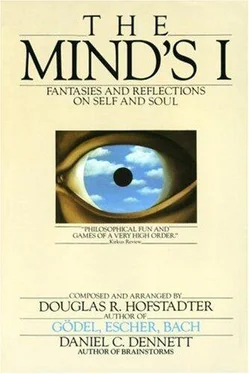ACHILLES: It would seem to me that the constant motion of ants to and fro would completely prevent the possibility of a very delicate distribution. Any delicate distribution would be quickly destroyed by all the random motions of ants, just as any delicate pattern among molecules in a gas would not survive for an instant, due to the random bombardment from all sides.
ANTEATER: In an ant colony, the situation is quite the contrary. In fact, it is just exactly the constant to-ing and fro-ing of ants inside the colony which adapts the caste distribution to varying situations, and thereby preserves the delicate caste distribution. You see, the caste distribution cannot remain as one single rigid pattern; rather, it must constantly be changing so as to reflect, in some manner, the real-world situation with which the colony is dealing, and it is precisely the motion inside the colony which updates the caste distribution, so as to keep it in line with the present circumstances facing the colony.
TORTOISE: Could you give an example?
ANTEATER: Gladly. When I, an anteater, arrive to pay a visit to Aunt Hillary, all the foolish ants, upon sniffing my odor, go into a panic—which means, of course, that they begin running around completely differently from the way they were before I arrived.
ACHILLES: But that’s understandable, since you’re a dreaded enemy of the colony.
ANTEATER: Oh, no. I must reiterate that, far from being an enemy of the colony, I am Aunt Hillary’s favorite companion. And Aunt Hillary is, my favorite aunt. I grant you, I’m quite feared by all the individual ants in the colony—but that’s another matter entirely. In any case, you see that the ants’ action in response to my arrival completely changes the internal distribution of ants.
ACHILLES: That’s clear.
ANTEATER: And that sort of thing is the updating which I spoke of. The new distribution reflects my presence. One can describe the change from old state to new as having added a “piece of knowledge” to the colony.
ACHILLES: How can you refer to the distribution of different types of ants inside a colony as a “piece of knowledge”?
ANTEATER: Now there’s a vital point. It requires some elaboration. You see, what it comes down to is how you choose to describe the caste distribution. If you continue to think in terms of the lower levels—individual ants—then you miss the forest for the trees. That’s just toy microscopic a level, and when you think microscopically, you’re bound to miss some large-scale features. You’ve got to find the proper high-level framework in which to describe the caste distribution—only then will it make sense how the caste distribution cal encode many pieces of knowledge.
ACHILLES: Well, how do you find the proper-sized units in which to describe the present state of the colony, then?
ANTEATER: All right. Let’s begin at the bottom. When ants need to get something done, they form little “teams,” which stick together to perform a chore. As I mentioned earlier, small groups of ants are constantly forming and unforming. Those which actually exist for while are the teams, and the reason they don’t fall apart is that there really is something for them to do.
ACHILLES: Earlier you said that a group will stick together if its size exceeds a certain threshold. Now you’re saying that a group will stick together if there is something for it to do.
ANTEATER: They are equivalent statements. For instance, in food gathering, if there is an inconsequential amount of food somewhere which gets discovered by some wandering ant who then attempts to communicate its enthusiasm to other ants, the number of ants who respond will be proportional to the size of the food sample—and a inconsequential amount will not attract enough ants to surpass the threshold. Which is exactly what I meant by saying there is nothing to do—too little food ought to be ignored.
ACHILLES: I see. I assume that these “teams” are one of the levels c structure falling somewhere in between the single-ant level and the colony level.
ANTEATER: Precisely. There exists a special kind of team, which I call “signal”—and all the higher levels of structure are based on signal. In fact, all the higher entities are collections of signals acting is concert. There are teams on higher levels whose members are no ants, but teams on lower levels. Eventually you reach the lowest-level teams—which is to say, signals—and below them, ants.
ACHILLES: Why do signals deserve their suggestive name?
ANTEATER: It comes from their function. The effect of signals is to traps port ants of various specializations to appropriate parts of the colony. So the typical story of a signal is thus: It comes into existence by exceeding the threshold needed for survival, then it migrates for some distance through the colony, and at some point it more or less disintegrates into its individual members, leaving them on their own.
ACHILLES: It sounds like a wave, carrying sand dollars and seaweed from afar, and leaving them strewn, high and dry, on the shore.
ANTEATER: In a way that’s analogous, since the team does indeed deposit something which it has carried from a distance, but whereas the water in the wave rolls back to the sea, there is no analogous carrier substance in the case of a signal, since the ants themselves compose it.
TORTOISE: And I suppose that a signal loses its coherency just at some spot in the colony where ants of that type were needed in the first place.
ANTEATER: Naturally.
ACHILLES: Naturally? It’s not so obvious to me that a signal should always go just where it is needed. And even if it goes in the right direction, how does it figure out where to decompose? How does it know it has arrived?
ANTEATER: Those are extremely important matters, since they involve explaining the existence of purposeful behavior—or what seems to be purposeful behavior—on the part of signals. From the description, one would be inclined to characterize the signals’ behavior as being oriented toward filling a need, and to call it “purposeful.” But you can look at it otherwise.
ACHILLES: Oh, wait. Either the behavior is purposeful, or it is not. I don’t see how you can have it both ways.
ANTEATER: Let me explain my way of seeing things, and then see if you agree. Once a signal is formed, there is no awareness on its part that it should head off in any particular direction. But here the delicate caste distribution plays a crucial role. It is what determines the motion of signals through the colony, and also how long a signal will remain stable, and where it will “dissolve.”
ACHILLES: So everything depends on the caste distribution, eh?
ANTEATER: Right. Let’s say a signal is moving along. As it goes, the ants which compose it interact, either by direct contact or by exchange of scents, with ants of the local neighborhoods which it passes through. The contacts and scents provide information about local matters of urgency, such as nest building, or nursing, or whatever. The signal will remain glued together as long as the local needs are different from what it can supply; but if it can contribute, it disintegrates, spilling a fresh team of usable ants onto the scene. Do you see now how the caste distribution acts as an overall guide of the teams inside the colony?
ACHILLES: I do see that.
ANTEATER: And do you see how this way of looking at things requires attributing no sense of purpose to the signal?
ACHILLES: I think so. Actually, I’m beginning to see things from two different vantage points. From an ant’s-eye point of view, a signal has no purpose. The typical ant in a signal is just meandering around the colony, in search of nothing in particular, until it finds that it feels like stopping. Its teammates usually agree, and at that moment the team unloads itself by crumbling apart, leaving just its members but none of its coherency. No planning is required, no looking ahead; nor is any search required to determine the proper direction. But from the colony ’s point of view, the team has just responded to a message which was written in the language of the caste distribution. Now from this perspective, it looks very much like purposeful activity.
Читать дальше











